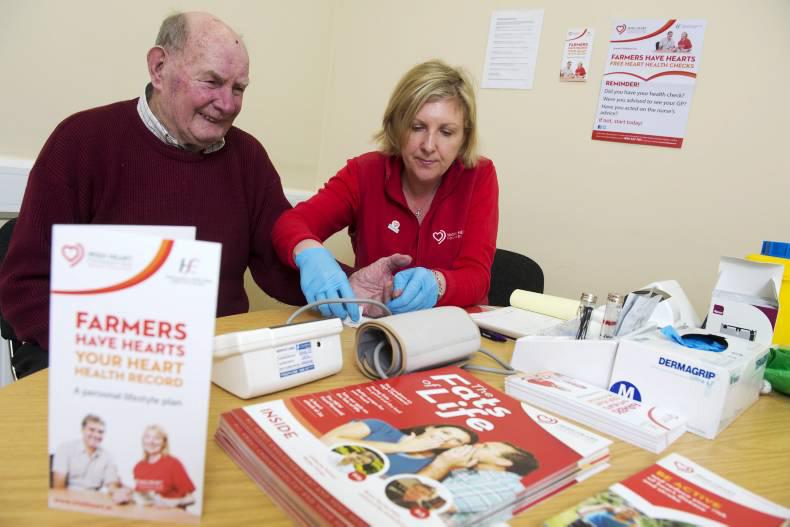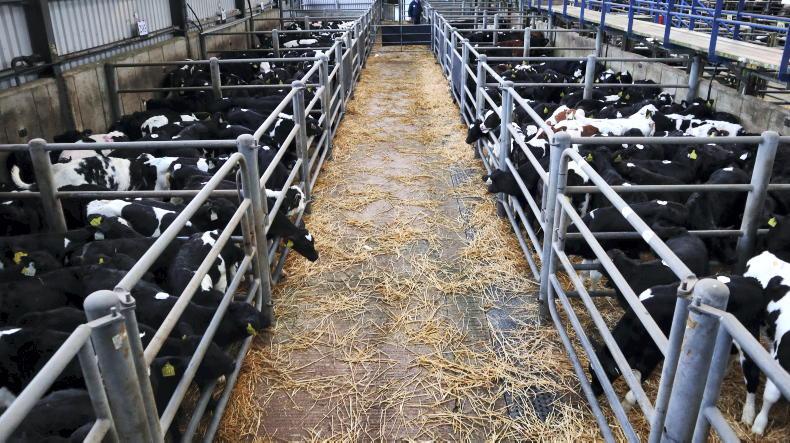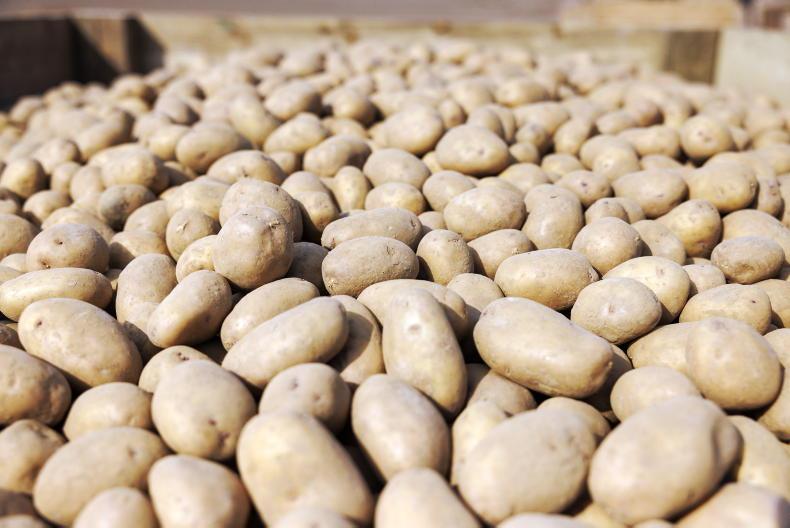The recent Farmers Have Hearts report didn’t paint a pretty picture of farming men’s health.
Eight out of 10 farmers who went for a health check at marts were advised to see their GPs. Raised blood pressure and cholesterol was a problem for nearly half of them.
The vast majority of farmers (86.4%) exceeded recommended BMI (kg/m2) levels of 25.0 BMI (kg/m2):
• 13.6% were the correct weight for their height. • 50.8% were classified as slightly overweight (having a BMI of 25.0 to 29.9). • 33.3% were considered obese to severely obese, with BMIs of 30.0 to 40.0. • 2.3% had BMIs of 40+ (were morbidly obese). A strong message came with this report – have a regular check-up with your GP. It is 20 minutes that could save your life.
But as well as regular check-ups, what lifestyle changes can farmers make, regardless of age, to ensure good health and reduce the risk of developing heart problems in the future?
Finian Murray, long-time HSE men’s health policy expert and a board member of Men’s Health Forum Ireland, has the following important tips:
1 Get your 30 minutes of physical activity every day. Make yourself do it, even if it’s walking to see the cattle as opposed to going on the quad. Thirty minutes of physical activity five days a week is recommended.
2 Watch those portion sizes. Because we are not as active as previous generations were, we should eat less. Like driving a car, you don’t need to overfill the tank. You fill the tank and use it up and then fill it again. It’s calories in versus calories out. We should definitely reduce our portion sizes because we’re not as active.
3 Keep your waist measurement under 37 inches (around your belly button). If you can keep yourself from becoming obese, you are at much less risk of developing type two diabetes. A lot of Irish people have it but it is undiagnosed. You should get blood sugar levels checked. If left untreated, it can be a lot worse.
4 Take care of your mental health. It came up a lot in the report – 64.2% of participating farmers reported experiencing stress some of the time and 16.4% reported feeling stressed a lot of the time. One of the best ways to deal with stress is exercise – go for a walk and clear your head.
5 If you’ve something wrong, don’t wait and hope it’ll go away. Go to a doctor and get it checked out and put your mind at ease. If there is something wrong, the doctor has a better chance of getting it cured.
6 Alcohol consumption and smoking. Watch your alcohol intake and don’t smoke.
THE MAN MANUAL
Familiar with Haynes car repair manuals? Well there is a Haynes man manual too. Written in the car manual format by Dr Ian Banks, it is called Challenges and Choices. Published by the Men’s Health Forum Ireland, it is full of good advice for men. A warning is issued on page two: “Reading this manual can seriously improve your health.”
It’s a no-nonsense, smart-choice booklet with a dash of humour thrown in. You’re given three choices: do nothing (and see where that will get you…); DIY (help yourself by making changes); or find an expert (all support organisation phone numbers are listed). Here is some of the advice:
FOOD
You wouldn’t put crude oil into your car, so take care over what you eat.
A traditional fried breakfast might be tempting and okay once in a while, but did you know that a typical fry-up with bacon, sausages, fried egg, toast and a dollop of sauce is going to take up:
• Half your recommended calories for the day.• Almost all your total saturated fat allowance.• Just about your entire daily salt intake.• Most of your daily protein as well.BLOOD PRESSURE
Remember, only by measuring your blood pressure will you know if you are in danger. A car tyre can look perfectly fine yet may be at a dangerous pressure.
A CHALLENGE FOR YOU
The man manual throws down these challenges for men that, if followed, will lead to better health. Here are a few:
1. Get your blood pressure checked within the next two weeks.2. Try some fruit or vegetables you’ve never tasted before.3. Walk or cycle, instead of going by car, at least once a week.4. Get a mate to quit smoking with you and get advice about how to stop.5. Order a soft drink next time you’re in the pub.TONY WARD – THE FACE OF MEN’S HEALTH WEEK 2015
The theme of this year’s Men’s Health Week is time for a new script.
“It’s about creating culture change when it comes to men thinking about health,” says Colin Fowler of Men’s Health Forum Ireland.“In Ireland, a lot more energy is spent on treating illnesses rather than preventing them, so the culture change we’re looking for is in preventing illnesses in the first place.”
Early detection and diagnosis are what it’s all about, he says.
“When men notice something (wrong) early on, the chances of survival and effective treatment are massively increased. That very simple message will make a huge difference.”
Former Ireland fly-half Tony Ward is fronting the Men’s Health campaign this year.
“He came out about his battle with prostate cancer last year,” says Colin.
“He came from the ’70s man’s man world where health problems weren’t talked about openly. This is changing but it has to change even more so that all men – including farmers – look after their health properly.”
Tony Ward’s message is this: “Men’s Health Week gives everyone an opportunity to do something positive and practical to improve the health of men and boys in Ireland.
“I know, from personal experience, that men certainly need to pay more attention to their health and to act quickly when they suspect something may be wrong. However, we live in a culture which expects men to keep their chin up and to soldier on through difficult times. This needs to change. It’s definitely time for a new script”.
HEART DOCTOR
Cardiologist Dr John Kenny, who treats many farming patients at the Bon Secours hospital in Cork, feels the results of the Farmers Have Hearts report are deeply disappointing.
“This is a valuable study and indicates that farmers have a lot to do if they want to reduce their risk of heart disease and stroke,” he says.
Exercise is something farmers aren’t doing properly, he believes.
“My experience is that farmers are very poor at taking aerobic exercise and this is confirmed in the study, with a third of them not being physically active for five days or more per week.
“Many farmers feel that because farm work is often physically demanding, they are getting enough exercise in their day-to-day work. But when this activity is analysed, it consists, in many cases, of stopping and starting as opposed to a brisk walk, cycle, swim or a gym workout lasting 30 to 40 minutes.
“It is this kind of exercise that you need to do to significantly reduce the risk of heart disease and stroke. Even farmers who have had treatments for heart disease, such as stenting or coronary artery bypass surgery, are often poor at taking exercise following these procedures. If farmers found the time to take more aerobic exercise they would significantly reduce the risk of heart disease and stroke.”
If farmers can reduce the number and the amount of risk factors they will substantially reduce their risk of heart disease and stroke, he adds.
“Prevention is better than cure. Farmers are very busy people, self-employed and, in many cases, working on their own, and therefore they tend to put their health on the long finger. You need to go to the doctor for a check-up because risk factors such as high blood pressure and high cholesterol don’t have symptoms. By visiting your GP on a regular basis, theses risk factors can be detected and treated. Similarly, you can receive advice on weight reduction and smoking cessation.”
Dr Kenny’s experience is that farmers don’t attend early enough with symptoms of heart disease and stroke.
“If any farmer has symptoms of chest pain or shortness of breath, it is important that they attend their GP early for evaluation of these symptoms.
“If the GP is concerned that this is an impending heart attack he can refer the farmer to a hospital for immediate admission or if he is uncertain of the causation of these symptoms he can refer to a rapid access chest pain clinic, which are available in many hospitals now such as in the Bon Secours.
“Symptoms can be evaluated and investigated within a couple of hours and the patient referred for further investigation and treatment or discharged home.”
IFA COMMENT – REPORT SHOULD BE WAKE-UP CALL
IFA president Eddie Downey encouraged farmers to visit their doctor on a regular basis and get a full check-up. He said the findings of the initiative undertaken by the Irish Heart Foundation should be a wake-up call.
“Three out of four farmers who participated in the check-up got advice to go and see their doctor.
“This underlines the importance of keeping an eye on your health. Farmers have a busy schedule, but they should make time as early intervention can be very significant in detecting a problem and beginning treatment.”
Along with the Haynes man manual, available at www.mhfi.org, don’t forget to look up Staying Fit For Farming – the booklet tailored to farmers’ health needs. It is available to download at www.teagasc.ie and www.hsa.ie.
If you have concerns about heart health you can ring the Irish Heart Foundation helpline on 1890-432-787 to chat to a specialist nurse or see www.irishheart.ie.
STRESS BUSTING TIPS
• Take time out.• Work out.• Chill out.• Talk it out. • Leave it out (smoking, junk food and alcohol).Food tips
• Grill rather than fry and try scrambled eggs and mushrooms on toast instead for breakfast.• Avoid – meat pies and sausages, fast food, hard cheese, butter and lard, pastry, cakes, biscuits, cream, coconut and palm oil (all high in saturated fats). • Do eat more oily fish (sardines and mackerel), avocados, nuts and seeds.• Leave it out (smoking, junk food and alcohol).
The recent Farmers Have Hearts report didn’t paint a pretty picture of farming men’s health.
Eight out of 10 farmers who went for a health check at marts were advised to see their GPs. Raised blood pressure and cholesterol was a problem for nearly half of them.
The vast majority of farmers (86.4%) exceeded recommended BMI (kg/m2) levels of 25.0 BMI (kg/m2):
• 13.6% were the correct weight for their height. • 50.8% were classified as slightly overweight (having a BMI of 25.0 to 29.9). • 33.3% were considered obese to severely obese, with BMIs of 30.0 to 40.0. • 2.3% had BMIs of 40+ (were morbidly obese). A strong message came with this report – have a regular check-up with your GP. It is 20 minutes that could save your life.
But as well as regular check-ups, what lifestyle changes can farmers make, regardless of age, to ensure good health and reduce the risk of developing heart problems in the future?
Finian Murray, long-time HSE men’s health policy expert and a board member of Men’s Health Forum Ireland, has the following important tips:
1 Get your 30 minutes of physical activity every day. Make yourself do it, even if it’s walking to see the cattle as opposed to going on the quad. Thirty minutes of physical activity five days a week is recommended.
2 Watch those portion sizes. Because we are not as active as previous generations were, we should eat less. Like driving a car, you don’t need to overfill the tank. You fill the tank and use it up and then fill it again. It’s calories in versus calories out. We should definitely reduce our portion sizes because we’re not as active.
3 Keep your waist measurement under 37 inches (around your belly button). If you can keep yourself from becoming obese, you are at much less risk of developing type two diabetes. A lot of Irish people have it but it is undiagnosed. You should get blood sugar levels checked. If left untreated, it can be a lot worse.
4 Take care of your mental health. It came up a lot in the report – 64.2% of participating farmers reported experiencing stress some of the time and 16.4% reported feeling stressed a lot of the time. One of the best ways to deal with stress is exercise – go for a walk and clear your head.
5 If you’ve something wrong, don’t wait and hope it’ll go away. Go to a doctor and get it checked out and put your mind at ease. If there is something wrong, the doctor has a better chance of getting it cured.
6 Alcohol consumption and smoking. Watch your alcohol intake and don’t smoke.
THE MAN MANUAL
Familiar with Haynes car repair manuals? Well there is a Haynes man manual too. Written in the car manual format by Dr Ian Banks, it is called Challenges and Choices. Published by the Men’s Health Forum Ireland, it is full of good advice for men. A warning is issued on page two: “Reading this manual can seriously improve your health.”
It’s a no-nonsense, smart-choice booklet with a dash of humour thrown in. You’re given three choices: do nothing (and see where that will get you…); DIY (help yourself by making changes); or find an expert (all support organisation phone numbers are listed). Here is some of the advice:
FOOD
You wouldn’t put crude oil into your car, so take care over what you eat.
A traditional fried breakfast might be tempting and okay once in a while, but did you know that a typical fry-up with bacon, sausages, fried egg, toast and a dollop of sauce is going to take up:
• Half your recommended calories for the day.• Almost all your total saturated fat allowance.• Just about your entire daily salt intake.• Most of your daily protein as well.BLOOD PRESSURE
Remember, only by measuring your blood pressure will you know if you are in danger. A car tyre can look perfectly fine yet may be at a dangerous pressure.
A CHALLENGE FOR YOU
The man manual throws down these challenges for men that, if followed, will lead to better health. Here are a few:
1. Get your blood pressure checked within the next two weeks.2. Try some fruit or vegetables you’ve never tasted before.3. Walk or cycle, instead of going by car, at least once a week.4. Get a mate to quit smoking with you and get advice about how to stop.5. Order a soft drink next time you’re in the pub.TONY WARD – THE FACE OF MEN’S HEALTH WEEK 2015
The theme of this year’s Men’s Health Week is time for a new script.
“It’s about creating culture change when it comes to men thinking about health,” says Colin Fowler of Men’s Health Forum Ireland.“In Ireland, a lot more energy is spent on treating illnesses rather than preventing them, so the culture change we’re looking for is in preventing illnesses in the first place.”
Early detection and diagnosis are what it’s all about, he says.
“When men notice something (wrong) early on, the chances of survival and effective treatment are massively increased. That very simple message will make a huge difference.”
Former Ireland fly-half Tony Ward is fronting the Men’s Health campaign this year.
“He came out about his battle with prostate cancer last year,” says Colin.
“He came from the ’70s man’s man world where health problems weren’t talked about openly. This is changing but it has to change even more so that all men – including farmers – look after their health properly.”
Tony Ward’s message is this: “Men’s Health Week gives everyone an opportunity to do something positive and practical to improve the health of men and boys in Ireland.
“I know, from personal experience, that men certainly need to pay more attention to their health and to act quickly when they suspect something may be wrong. However, we live in a culture which expects men to keep their chin up and to soldier on through difficult times. This needs to change. It’s definitely time for a new script”.
HEART DOCTOR
Cardiologist Dr John Kenny, who treats many farming patients at the Bon Secours hospital in Cork, feels the results of the Farmers Have Hearts report are deeply disappointing.
“This is a valuable study and indicates that farmers have a lot to do if they want to reduce their risk of heart disease and stroke,” he says.
Exercise is something farmers aren’t doing properly, he believes.
“My experience is that farmers are very poor at taking aerobic exercise and this is confirmed in the study, with a third of them not being physically active for five days or more per week.
“Many farmers feel that because farm work is often physically demanding, they are getting enough exercise in their day-to-day work. But when this activity is analysed, it consists, in many cases, of stopping and starting as opposed to a brisk walk, cycle, swim or a gym workout lasting 30 to 40 minutes.
“It is this kind of exercise that you need to do to significantly reduce the risk of heart disease and stroke. Even farmers who have had treatments for heart disease, such as stenting or coronary artery bypass surgery, are often poor at taking exercise following these procedures. If farmers found the time to take more aerobic exercise they would significantly reduce the risk of heart disease and stroke.”
If farmers can reduce the number and the amount of risk factors they will substantially reduce their risk of heart disease and stroke, he adds.
“Prevention is better than cure. Farmers are very busy people, self-employed and, in many cases, working on their own, and therefore they tend to put their health on the long finger. You need to go to the doctor for a check-up because risk factors such as high blood pressure and high cholesterol don’t have symptoms. By visiting your GP on a regular basis, theses risk factors can be detected and treated. Similarly, you can receive advice on weight reduction and smoking cessation.”
Dr Kenny’s experience is that farmers don’t attend early enough with symptoms of heart disease and stroke.
“If any farmer has symptoms of chest pain or shortness of breath, it is important that they attend their GP early for evaluation of these symptoms.
“If the GP is concerned that this is an impending heart attack he can refer the farmer to a hospital for immediate admission or if he is uncertain of the causation of these symptoms he can refer to a rapid access chest pain clinic, which are available in many hospitals now such as in the Bon Secours.
“Symptoms can be evaluated and investigated within a couple of hours and the patient referred for further investigation and treatment or discharged home.”
IFA COMMENT – REPORT SHOULD BE WAKE-UP CALL
IFA president Eddie Downey encouraged farmers to visit their doctor on a regular basis and get a full check-up. He said the findings of the initiative undertaken by the Irish Heart Foundation should be a wake-up call.
“Three out of four farmers who participated in the check-up got advice to go and see their doctor.
“This underlines the importance of keeping an eye on your health. Farmers have a busy schedule, but they should make time as early intervention can be very significant in detecting a problem and beginning treatment.”
Along with the Haynes man manual, available at www.mhfi.org, don’t forget to look up Staying Fit For Farming – the booklet tailored to farmers’ health needs. It is available to download at www.teagasc.ie and www.hsa.ie.
If you have concerns about heart health you can ring the Irish Heart Foundation helpline on 1890-432-787 to chat to a specialist nurse or see www.irishheart.ie.
STRESS BUSTING TIPS
• Take time out.• Work out.• Chill out.• Talk it out. • Leave it out (smoking, junk food and alcohol).Food tips
• Grill rather than fry and try scrambled eggs and mushrooms on toast instead for breakfast.• Avoid – meat pies and sausages, fast food, hard cheese, butter and lard, pastry, cakes, biscuits, cream, coconut and palm oil (all high in saturated fats). • Do eat more oily fish (sardines and mackerel), avocados, nuts and seeds.• Leave it out (smoking, junk food and alcohol). 








SHARING OPTIONS